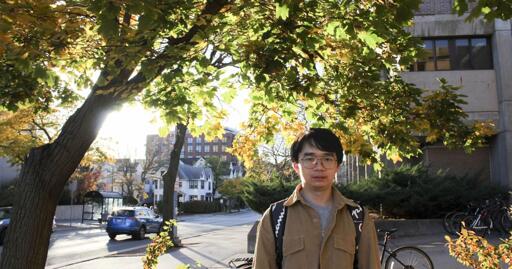MADISON — On the crisp afternoon of Oct. 22, Shanglin Yang walked down State Street, a route he had taken countless times since beginning his computer science studies at the University of Wisconsin-Madison.
But this time, he said, two men approached him, making loud monkey noises and filming his reaction on their phones. Their laughter echoed as they got close to Yang, he said. As an Asian international student originally from Shenzhen — a tech hub often called “China’s Silicon Valley” — Yang said he felt exposed, targeted and humiliated.
A UW-Madison student who witnessed the incident and asked not to be identified by her full name — fearing repercussions — acted quickly, taking photos of the harassers.
“They were mocking him, and it was clear their behavior wasn’t meant as a joke,” the student, Megan, said. “I just reacted quickly to document what I saw.”
In the days following the incident, campus sources identified one of the men as an undergraduate student in the university’s School of Business.
The incident has brought attention to a larger conversation about the campus climate at UW-Madison. While the university has announced plans to double its international student population over the next four years, enrollment among students of color has dropped. According to a Cap Times report, the percentage of underrepresented students of color in the first-year class dropped from 18% in 2023 to 14.3% this fall.
Yang is among nearly 8,000 international students from 125 countries around the world who are studying at UW-Madison. Those students contribute an estimated $339.7 million annually to Madison’s economy, according to the Association of International Educators. Yet incidents like this raise a question: Is UW-Madison prepared to support and protect its increasingly diverse student body?
“Diversity isn’t just a buzzword,” said Lyn van Swol, a professor of communication science at UW-Madison. “It’s about creating norms of inclusion that aren’t just performative but deeply ingrained in the culture. Schools need to set a precedent that bias and harassment will not be tolerated.” Institutional silence and delayed responses
Even though bystanders stepped in to help, Yang said he felt ignored in his efforts to seek accountability through official channels. After filing a report with the Office of Student Assistance and Support, he followed up on Oct. 29 but didn’t hear back for weeks. When he contacted the Madison Police Department, a dispatcher questioned why he hadn’t reported the incident sooner, Yang said. Weeks passed without further updates.
“I thought reporting it would lead to some action, but all they offered was a ‘voluntary conversation’ with one of the guys who harassed me,” Yang said. “It felt like they just wanted me to move on and let it go.”
Seeking further support, Yang turned to faculty allies, including Kathryn McGarr, a professor in the School of Journalism and Mass Communication, and Alexander Hopp, a professor in Asian American Studies. Both professors advocated on his behalf, contacting the Office of Student Assistance and Support and the Office of Compliance to push for a formal investigation.
“I’m very grateful for the support I’ve received from Alex, Kathryn, Megan and so many others,” Yang said. “But this is the school’s responsibility — it shouldn’t fall on others to fight for me.”
When Yang followed up with the Office of Student Conduct and Community Standards on Nov. 12, this is the emailed response he received:
“We cannot disclose information about one student’s record with another student,” wrote Ryan Podolak, the associate director responsible for the office. “If there is additional information you have since submitting the intiial report, you can send that to me.”
The email contained typos, including “intiial” instead of “initial,” and incorrectly suggested that Yang was inquiring about another student’s record rather than his own.
“When something happens, you realize how much of that is just words,” Yang said. “The very institutions that are supposed to protect you just look the other way.” A broader pattern of neglect
Feeling let down by the institutions he thought would protect him, Yang turned to Reddit to share his experience. Within hours, his post went viral, drawing over 280,000 views and more than 300 comments — far exceeding the typical Reddit engagement, where posts average around 49 comments. It resonated deeply with people of color across campus who could relate to his frustration.
Reddit post by Shanglin Yang
UW-Madison international student Shanglin Yang posted on Reddit about a harassment incident on State Street and received over 300 comments, with many readers sharing their own experiences as students of color. Screenshot from Reddit
One commenter, writing under the name AffectionateRing9860, echoed Yang’s frustration:
“I have gone through a similar situation as an Asian American student at UW-Madison.”
Another user, Ketchup_182, invoked a recent memory:
“Just a couple of years ago, a UW student was caught on video saying Black people should be sent ‘back to the cotton fields,’ and absolutely nothing was done.”
The comment appeared to refer to a racist video that circulated on social media in the spring of 2023, after which nearly 60,000 people signed an online petition calling for the white student’s suspension. UW-Madison officials and legal scholars noted the university was unable to punish the student because of her First Amendment rights.
Ch053n1, another Reddit user, reflected on the vulnerability that many Asian students feel: “Unfortunately, the reason this happens is because they know Asians are easy targets and won’t do anything if they pick on you.”
The top comment read: “I’m currently in a First Amendment class at UW. Since the incident occurred off campus, it’s unlikely UW is able to do anything about it.”
“Nothing is going to happen,” wrote BlckMetalPotatoes.
Many commenters voiced disappointment with what they perceived as systemic inaction by the university.
“UW-Madison really fails students of color/non-white students,” wrote gopackgo15. “That’s the worst thing about this school. I really hope there’s some kind of resolution.” The university responds, belatedly
On Nov. 15, the Cap Times began investigating Yang’s case, contacting university offices and law enforcement for answers. This is how those offices responded:
The Madison Police Department classified the case as a “disturbance” and closed it on Nov. 20, citing no physical altercation. The department explained that Wisconsin’s “hate crime enhancer” statute could not be applied due to a lack of clear evidence of intent. The UW–Madison Police Department clarified that its jurisdiction typically does not extend to off-campus incidents unless tied to campus-specific threats. The UW Office of Student Assistant and Support and the Office of Student Conduct, initially unresponsive to inquiries, both contacted Yang on Nov. 20 to inform him the student involved was being addressed. On Nov. 22, Jenny Bernhardt, communications director for Vice Chancellor for Student Affairs Lori Reesor, responded with additional context. Bernhardt said UW-Madison follows established processes to investigate student misconduct, but federal privacy laws prevent the university from sharing many details. She also emphasized that UW-Madison is committed to supporting students who report bias incidents, whether they happen on or off campus. UW Media Relations declined to comment on the case.“I find it ironic,” Yang said. “For a month, no one took any action. But the moment reporters got involved, suddenly everyone had something to say. It shows the power of the media and also highlights how the university could have acted sooner but chose not to until it became public.”
Detective Gracia Rodriguez, who oversaw the Madison Police investigation, said the two men claimed their actions were part of a TikTok trend. However, the detective did not specify which trend, and an independent search by the Cap Times found no evidence of such behavior trending on TikTok.
Megan, the UW-Madison student who witnessed the incident, rejected the explanation.
“I think they made up that excuse,” she said. “What they did and what I saw is not a game. If it were, they should’ve targeted one of their friends — not a stranger.”
She expressed frustration with how the case was handled.
“When Detective Garcia called to tell me the case was closed, it felt like being silenced,” Megan said. “It wasn’t until the Cap Times got involved that they started reaching out again.”
As a UW-Madison student who initially studied legal studies before switching to nursing, she said she respects law enforcement but believes the case was mishandled.
“This was brushed under the rug and not taken seriously,” she said. “What those boys did was a crime, and they lied to the police about it — and the police believed them. This isn’t an isolated case. The school and the people meant to protect us have silenced the victim.”
Yang, meanwhile, has filed a Civil Rights Investigation request with the university’s Office of Compliance, shifting focus from what happened on State Street to what the university will do next.
“I’m not asking for extreme punishments,” Yang said. “But I do expect the university to stand by its values and take incidents like this seriously.”
Reflecting on President Franklin D. Roosevelt’s 1941 “Four Freedoms” speech — freedom of speech, freedom of worship, freedom from want and freedom from fear — Yang added: “Human rights are supposed to be about freedom and equality. But if the First Amendment protects the freedom of speech for harassers, who is protecting the freedom from fear for people of color?”


